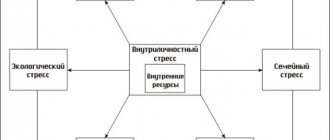According to statistics, every third woman after the birth of a baby feels nervous tension. Childbirth is a strong stress factor, the body and mind undergo many changes, and there is high emotional and physical stress. Usually, stress after childbirth goes away after one to two weeks, but sometimes it drags on and develops into postpartum depression - a serious condition that is difficult to cope with on your own. This condition has an extremely negative impact on the mother’s well-being, lactation and relationship with the child.
Causes of postpartum stress
Every woman who has given birth may face negative experiences after childbirth. It cannot be said that the problem concerns only those women who find themselves in difficult life situations. Mothers, surrounded by the care and attention of loved ones, are equally susceptible to stress. What causes postpartum stress?
- Expectations did not match reality. For example, a woman had a cesarean section, but she planned to give birth on her own. Or you were not satisfied with the conditions in the maternity hospital, your own behavior during childbirth, and so on.
- Complications in the mother or baby. This is a high level of stress, especially if the mother in labor is not shown the baby, she does not know what condition it is in, and doctors do not provide enough information and support.
- Fear of harming the child, inability to handle a newborn. This type of stress is usually experienced by young mothers with their first baby.
- Fear for your figure, rejection of your own body. This is a special type of tension, it is experienced by a certain type of woman, for whom satisfaction with one’s own appearance is the foundation of personality and self-confidence. In such cases, there is a refusal to feed the baby milk for fear of spoiling the shape of the breast and other ways to “preserve oneself.”
- Some women in labor cannot accept parental responsibility and do not see themselves as mothers.
Among other things, a woman may worry about the uncomfortable situation in the family and in her relationship with her husband. For example, the husband was against the birth of a second child or was not ready to provide support and take care of the weakened woman and the baby. Also, a woman may be exhausted, confused, and experience physiological difficulties, which is quite predictable after the birth process.
All of these factors cause extreme stress. Experts also tend to associate changes in a woman’s mental state with hormonal changes, but there is no reliable information about a 100% relationship.
Some experts suggest that mothers who previously suffered from emotional fluctuations during menstruation are exposed to severe stress, but this is also just a theory.
How long does postpartum depression last?
If we talk about how long postpartum depression lasts, then everything depends on the severity of its manifestations. Thus, mild depression can last up to 4-6 months. If depression is accompanied by psychosis, then this condition can haunt a woman for up to a year or more. An important role in the duration of depression after childbirth is played by the general atmosphere in the family, the arrangement of everyday life, the presence or absence of support from loved ones, financial situation, as well as the character of the woman. Often the development of the disease is a consequence of reluctance to seek help.
Symptoms
Postpartum stress manifests itself on the first or third day after the birth of the baby. Starting to care for a newborn requires effort, the woman experiences anxiety, and sometimes complete rejection of her child. Experts distinguish between mild and severe stress after childbirth.
Mild stress
With a mild form of stress, the mother experiences tearfulness, irritability, mood swings, and fatigue. At the same time, she is sensitive to the newborn, but cannot cope with the new emotional load. If the course is favorable, the symptoms go away and the woman enters a new direction in life.
Severe stress
Severe stress is less common and symptoms last much longer. A woman who has given birth experiences irresistible apathy, cannot approach the child, take him in her arms, and feels aggression towards him. The emotional background is depressed, the woman is on the verge of a breakdown. In this case, you cannot do without the consultation and support of a specialist; you need psychological help.
Video: program “What is our birth like”, topic “Postpartum depression: myth or reality?”
Causes of stress in women after pregnancy
With the birth of a baby, a woman’s life completely changes. She needs to get used to a new social role. Adaptation proceeds differently for everyone. For some, the negative psycho-emotional state goes away on the first or third day after the birth of the baby. For others, it worsens and becomes chronic, becoming one of the causes of possible stress.
Depression from chronic fatigue
No less often stress occurs:
- Due to the unpreparedness of young girls for the process of childbirth. More often this applies to those women who give birth to their first child. Unpreparedness of a psycho-emotional nature, as well as the unpredictable scenario of the birth itself, contributes to emotional stress.
- Health problems in a woman or baby.
- Lack of experience in handling a newborn, which is often present in young mothers.
- Problems with parental responsibility due to the fact that the person’s psyche is not ready for a new role.
- Worries about problems with excess weight and a changed figure.
- No less rarely, a tense situation in the family can affect the emotional state of a young mother.
The first weeks after the birth of a baby are the most difficult for his parents. The child often screams and does not sleep at night. For his parents, this is a period of lack of sleep, nervousness and conflicts arising from nervousness. As a result, the girl receives a lot of negative emotions from the outside, already suffering from stress after childbirth.
Psychologists tried to draw “parallels” with the stressful state of young mothers and their psycho-emotional state before pregnancy, during menstruation. Based on the results of numerous surveys and experiments, it was possible to find out that those girls who suffered from stress during menstruation before giving birth were in this condition after pregnancy.
How does stress affect lactation?
The new role of a mother is exciting in itself, and if a woman faces stress, then her experiences affect many processes in the body, including lactation. Severe maternal stress affects the mechanism of milk formation and sometimes it can be difficult to restore it. A vicious circle begins - stress leads to a lack of breast milk, which creates even deeper stress.
If a woman is nervous about her appearance, her relationship with her husband, or fears for the baby’s health, then the synthesis of maternal hormones is suppressed by stress hormones. That is why doctors and psychologists advise maintaining a good emotional state and avoiding stressful situations. Sometimes it is enough to calm down to restore full lactation.
In some cases, a woman is nervous about the baby’s low weight gain, supplements him with formula, and as a result completely replaces breastfeeding with it. To restore lactation in this case, consultation with a breastfeeding specialist is required. The inability to organize the feeding process causes severe stress in some women and leads to depression.
Features of stress after childbirth
Pregnancy is a difficult period for every woman. Carrying a fetus leaves its “imprint” on the psycho-emotional state of the expectant mother. Problems are also possible after pregnancy. According to statistics, every third woman experiences postpartum stress.
Psychologists are confident that the main cause of postpartum stress is the birth itself. In addition, the state of the body is affected by emotional and physical stress that a woman faces both before and after childbirth.
Postpartum depression occurs in 15% of mothers
How to cope?
Psychologists have developed many recommendations on how to recover after childbirth and protect yourself from the influence of stress factors. Let's look at some tips. How to escape from stress so that it does not develop into postpartum depression?
Get involved in caring
Taking care of your baby will help you cope with your worries. Take him in your arms, talk to him, change diapers, get used to his face, look at his little arms and legs. The sooner a woman gets involved in caring for the child, the sooner she will end the period of stress after childbirth. In addition, when caring for a newborn, the mother produces the hormone oxytocin, which is responsible for milk production. This way you can establish lactation and not worry about the impossibility of breastfeeding.
Don't become isolated
Communication and acquaintance with mothers who have just given birth. Loneliness and the inability to discuss your problems leads to stress. You can start communicating during pregnancy, for example, on local forums on the Internet. This will allow you to find new friends and company for communication after leaving the maternity hospital.
Pleasures
Don't deprive yourself of pleasure. Yes, there are few available entertainment options with your baby, but you can arrange an evening ritual for yourself. For example, mom relaxes for 30 minutes in the evening with a book, takes a shower, or watches her favorite show. Sometimes this is enough to come to your senses and get out of a negative emotional state.
Husband's help
Psychologists say that fathers do not immediately activate the mechanism of unconditional love.
It is worthwhile to immediately involve your husband in caring for the child. Men need time to fall in love with a child, and this can only be done while caring for the baby. Let the spouse’s responsibilities include daily bathing and recording videos for the family archive. Ask him to help cut his son or daughter’s nails, let the father carry the child in his arms more often. Talk about new roles, be together.
Rest, rest and more rest
Sleep with your baby, do not try to do household chores during the newborn's short nap. During the first months, you don’t need to be an exemplary housewife, cook delicious meals and do regular cleaning. Now you need to rest more, otherwise fatigue will lead to an even greater breakdown. Some mothers claim that even two hours of sleep can replenish emotional resources.
Symptoms of stress
Postpartum stress often appears as early as the second week after the baby is born. The first symptoms of a stressful state are:
- irritability;
- changeable mood;
- apathy;
- fatigue.
Symptoms of Postpartum Stress
Psychologists say that such signs in the mother are considered mild and disappear within the first 2-3 weeks. The new emotional load gradually becomes part of the girl’s real life. She manages to overcome difficulties and gets used to the new routine and activities. But, if this condition drags on, other symptoms of stress may appear, which experts call severe:
- depression;
- attacks of aggression;
- hostility towards the baby.
Hair loss after childbirth
When a young mother becomes depressed, her maternal instinct fades. She is unable to cope with difficulties, so she wants to “run away” from them. This condition is comparable to a nervous breakdown. The girl systematically throws tantrums, behaves selfishly and aggressively not only towards her husband, but also towards the child.
Attacks of aggression are a symptom
Some advice from psychologists
If you couldn’t overcome stress on your own or prevent it, then don’t be upset. You can go to a psychologist who will find out the main reasons for the woman’s experiences and help return her to a normal psycho-emotional state. Most often, only one appointment with a psychologist is required, since young mothers do not have time for long sessions with a specialist.
Yoga meditation against depression
Psychologists often recommend to their patients:
- Find a hobby that will help a woman relax, but not forget about her child. A good example is a photo collage made up of pictures of a baby with his mother, father and relatives. While making such a collage, a woman will be able to relax and pay attention to her child.
- Move more. Walking in the fresh air is beneficial for both the baby and his mother. Walking promotes the production of endorphins (pleasure hormones).
- Laugh more. If circumstances do not encourage a woman to laugh, she should spend time watching a comedy or TV show.
- Rebuild your routine. The main causes of stress in women after childbirth include difficulties with time management. Before the birth of a child, a woman is accustomed to one regime, but with the advent of the baby everything changes. You need to adapt to the child.
- Adjust the menu. A person’s vigor depends on his diet and diet. It is necessary to remove confectionery and semi-finished products from the diet. It is better to eat carbohydrates (porridge, pasta and vegetables) and protein (meat, cottage cheese, etc.). The main thing is to reduce your consumption of fatty foods.
- The more time a young mother devotes to herself and her child, the stronger her resistance to stress will be. This means that she will be able to easily overcome all difficulties and even avoid them. The more time a woman spends with her baby, the more she feels like a mother, responsible not only for herself, but also for another person.
There is no need to bear the burden of responsibility and try to overcome difficulties on your own. Dads need to be involved too.
‚Moments of rest and relaxation
Their support is invaluable. Therefore, you should spend more time as a family, talking with each other, playing with the child, feeding and bathing him. And with such a favorable emotional background in the family, stress will not be so frequent and severe. In addition, the baby’s mental health will also be normal, because he will grow up in a family, where he is loved and appreciated, and his parents never fight.
Treatment of nerves after childbirth with medications
If it is not possible to normalize the emotional state with psychological techniques, medications are needed. Only a doctor should prescribe them and choose the dosage. At the beginning of therapy, it can be regular valerian tablets. The drug will reduce irritability, excitability, and relieve insomnia.
B vitamins will have a supporting effect in case of upset nerves. They are also allowed during breastfeeding.
The benefit of vitamins for restoring mental balance is that these substances promote a surge of energy, improve overall well-being, and strengthen the central nervous system.
For more severe symptoms of a nervous disorder, a specialist may prescribe antidepressants. Some of them (Amitriptyline, Nortriptyline, Fluoracisine) are also acceptable for use during lactation. Drugs in this series will help increase the production of substances responsible for emotional balance. They also block the production of components that awaken negative nervous reactions.
It should be borne in mind that the effect of antidepressant therapy is felt 2 - 3 weeks after the start of treatment. Therefore, you should not cancel them yourself at an earlier stage of treatment. It is prohibited to adjust the dosage without a doctor.
Watch the video about postpartum depression:










